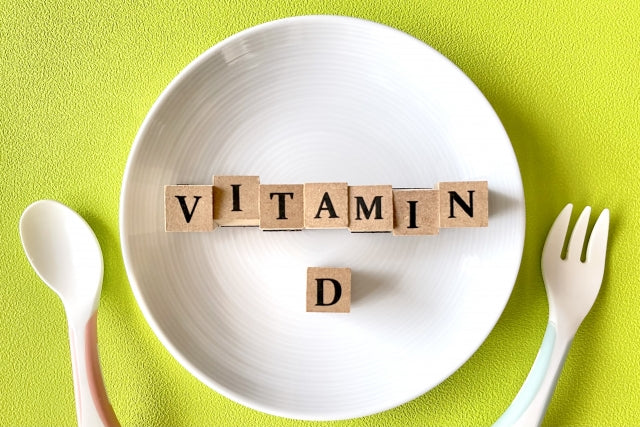Vitamin D, often referred to as the "sunshine vitamin," plays a crucial role in maintaining overall health. Despite being a nutrient we can produce naturally through sun exposure, many people worldwide don’t get enough of it. This is why Vitamin D supplementation has become an essential part of modern health routines.
But why is Vitamin D so important, and what makes it unique among vitamins? Let’s dive into its key roles in the body and explore the benefits it offers for bone health, immune function, and much more.
What is Vitamin D?

Vitamin D is a fat-soluble vitamin that our bodies produce when exposed to sunlight, particularly ultraviolet B (UVB) rays. While we can also get it from certain foods and supplements, the primary source is sunlight. There are two main forms of Vitamin D:
- Vitamin D2 (Ergocalciferol): Found in some plant-based foods and fortified products like cereals and plant-based milks.
- Vitamin D3 (Cholecalciferol): The more potent form, primarily obtained from animal-based sources like fatty fish, egg yolks, and liver, and synthesized in the skin when exposed to sunlight.
Once produced or consumed, Vitamin D must undergo two conversions in the body—first in the liver and then in the kidneys—before it becomes active and usable by the body.
The Role of Vitamin D in Bone Health

Vitamin D is best known for its role in promoting bone health. It aids in the absorption of calcium and phosphorus, two minerals essential for building and maintaining strong bones and teeth. Without enough Vitamin D, calcium absorption is compromised, leading to weakened bones, which can increase the risk of fractures, osteoporosis, and rickets in children.
For older adults, ensuring adequate Vitamin D intake is particularly important as it helps maintain bone density and reduces the risk of falls and fractures.
Boosting the Immune System with Vitamin D

Beyond its role in bone health, Vitamin D is also a powerful immune system modulator. Research shows that Vitamin D plays a key role in enhancing the pathogen-fighting effects of white blood cells, such as T-cells and macrophages, which are crucial for defending the body against infections.
Low levels of Vitamin D have been associated with an increased susceptibility to infections, including colds, flu, and respiratory illnesses. Some studies even suggest that maintaining adequate Vitamin D levels can reduce the risk of severe respiratory infections, making it particularly valuable during the colder months when people are more likely to be indoors and exposed to fewer sunlight hours.
Vitamin D and Mood Regulation

Vitamin D is also linked to mood regulation. Known as the “sunshine vitamin,” it has been associated with reducing symptoms of depression and enhancing overall mental well-being. Many people experience low mood or depressive symptoms during the winter months due to decreased sun exposure, a condition commonly known as seasonal affective disorder (SAD). This is where Vitamin D supplementation can help restore balance and lift your mood.
By interacting with neurotransmitters in the brain, Vitamin D helps regulate mood, making it an important vitamin for mental health as well as physical health.
How Vitamin D Supports Muscle Function
While Vitamin D is often associated with bones, it’s also important for muscle function. Adequate Vitamin D levels help improve muscle strength and function, which is especially important for older adults who may experience muscle weakness and an increased risk of falls. By supporting both bones and muscles, Vitamin D helps maintain mobility and independence as we age.
Sources of Vitamin D

While sun exposure is the best way to get Vitamin D, there are other dietary sources and supplements that can help you meet your daily needs, especially if you live in an area with limited sunlight or spend most of your time indoors.
Here are some of the best sources of Vitamin D:
- Fatty fish: Salmon, mackerel, sardines, and tuna are rich in Vitamin D3.
- Egg yolks: A small but good source of Vitamin D.
- Fortified foods: Many dairy products, orange juice, and cereals are fortified with Vitamin D.
- Mushrooms: Some types of mushrooms exposed to UV light can provide Vitamin D2.
For those who struggle to get enough Vitamin D from food or sunlight, supplements are an easy and effective option.
How Much Vitamin D Do You Need?

The amount of Vitamin D you need depends on your age, location, and lifestyle. The recommended daily intake varies, but here’s a general guideline:
- Infants (0-12 months): 400 IU (International Units)
- Children and adults (1-70 years): 600 IU
- Adults over 70 years: 800 IU
- Pregnant and breastfeeding women: 600 IU
Some experts recommend higher doses for people with limited sun exposure or certain health conditions, so it’s always a good idea to consult a healthcare provider for personalized advice.
Who is at Risk for Vitamin D Deficiency?

Despite the ease of obtaining Vitamin D from sunlight, deficiency is surprisingly common. Factors that increase the risk of deficiency include:
- Living in northern latitudes: People living in areas with long winters or little sunlight may not get enough Vitamin D from sun exposure alone.
- Dark skin tone: Higher levels of melanin in the skin can reduce the skin’s ability to produce Vitamin D from sunlight.
- Older age: As we age, our skin becomes less efficient at producing Vitamin D.
- Limited outdoor activity: Spending long hours indoors or avoiding sun exposure can limit Vitamin D production.
- Obesity: Excess body fat can interfere with Vitamin D absorption.
Signs of Vitamin D deficiency include fatigue, bone pain, muscle weakness, and a higher risk of infections. If you suspect you’re not getting enough Vitamin D, a blood test can confirm your levels, and supplements may be recommended.
Recommended Japanese Vitamin D Supplements

DHC Vitamin D:
While Vitamin D can be naturally produced in the body through sun exposure, its production decreases with age. Although found in foods like fish and mushrooms, those with unbalanced diets may lack this essential nutrient. DHC's Vitamin D supplement provides a highly active form of Vitamin D3, with each daily capsule containing 25μg (1,000 IU) of Vitamin D3.This supplement is ideal for individuals who spend extended time indoors, avoid UV exposure to protect their skin, or simply want to maintain optimal health year-round.
UHA High-Concentration Vitamin D:
UHA's instant melt supplement has arrived! With a delicious sparkling grape flavor, simply take two tablets per day to easily consume 37.5mg (1,000 IU) of Vitamin D. No water is needed, as the tablets dissolve instantly in your mouth, providing a smooth, melt-in-your-mouth experience. Even those with low saliva production can comfortably take this supplement thanks to its quick-dissolving formula. Designed for adults 18 and older, it is sugar-free and calorie-controlled, making it safe for those watching their diet.
Choosing the Right Vitamin D Supplement

When it comes to supplements, both Vitamin D2 and D3 are available. While both forms can help increase Vitamin D levels, research suggests that Vitamin D3 is more effective at raising and maintaining those levels over time.
Vitamin D supplements come in various forms, including tablets, capsules, and liquid drops, making it easy to choose one that fits your lifestyle. For optimal absorption, it’s best to take Vitamin D with a meal that contains some fat.
Conclusion: Vitamin D for Total Health
Vitamin D may be a small nutrient, but its impact on your health is huge. From supporting strong bones and muscles to boosting your immune system and regulating mood, this “sunshine vitamin” is vital for keeping your body and mind functioning at their best.
Whether through sun exposure, food, or supplements, ensuring you get enough Vitamin D is one of the simplest and most effective ways to support long-term health and well-being. So, don’t underestimate the power of this essential nutrient—make Vitamin D a priority in your daily routine for a brighter, healthier future.




